Medication Management Challenges: A Newly Graduated Nurse's Essay
VerifiedAdded on 2020/05/08
|10
|2599
|59
Essay
AI Summary
This essay, authored by a newly graduated nurse, delves into the multifaceted challenges of medication management in a clinical setting. The author identifies medication management as a crucial area for newly graduated nurses to develop proficiency in, addressing issues such as medicine delivery, storage, administration, side effect recognition, and complications. The essay highlights the transition from theoretical knowledge to practical application, emphasizing the impact of stress, workload, and lack of experience on medication errors, particularly with intravenous medications. The author discusses the importance of developing competencies, building confidence, and utilizing reflective practices to improve patient care and safety. Furthermore, the essay explores broader challenges faced by new nurses, including role ambiguity, bullying, and the need for effective teamwork. The author concludes by emphasizing the importance of the '6 R's' of medication management and the need for practical learning, confidence-building, and effective teamwork to overcome these hurdles. The essay references several academic sources to support the arguments and provide a comprehensive overview of the topic.
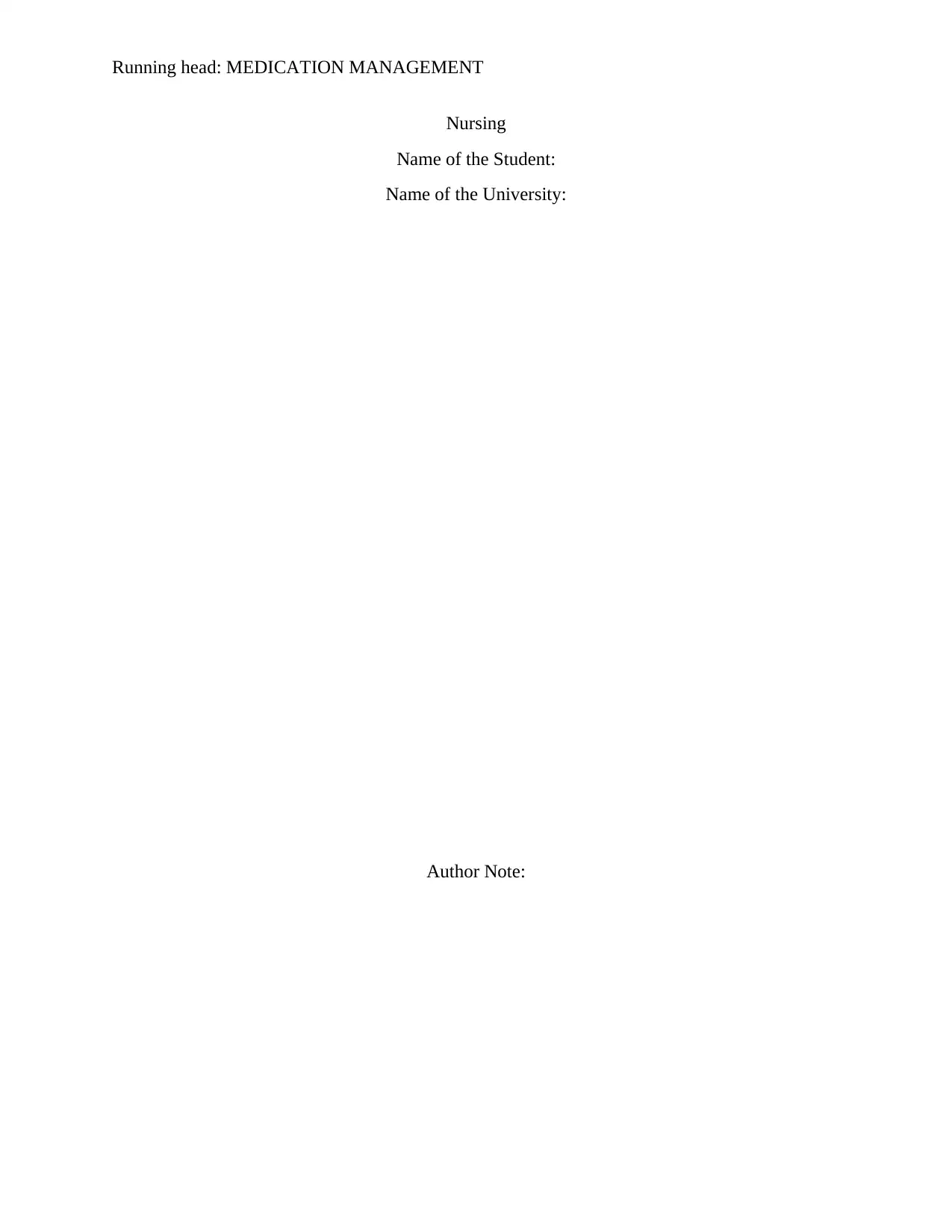
Running head: MEDICATION MANAGEMENT
Nursing
Name of the Student:
Name of the University:
Author Note:
Nursing
Name of the Student:
Name of the University:
Author Note:
Paraphrase This Document
Need a fresh take? Get an instant paraphrase of this document with our AI Paraphraser
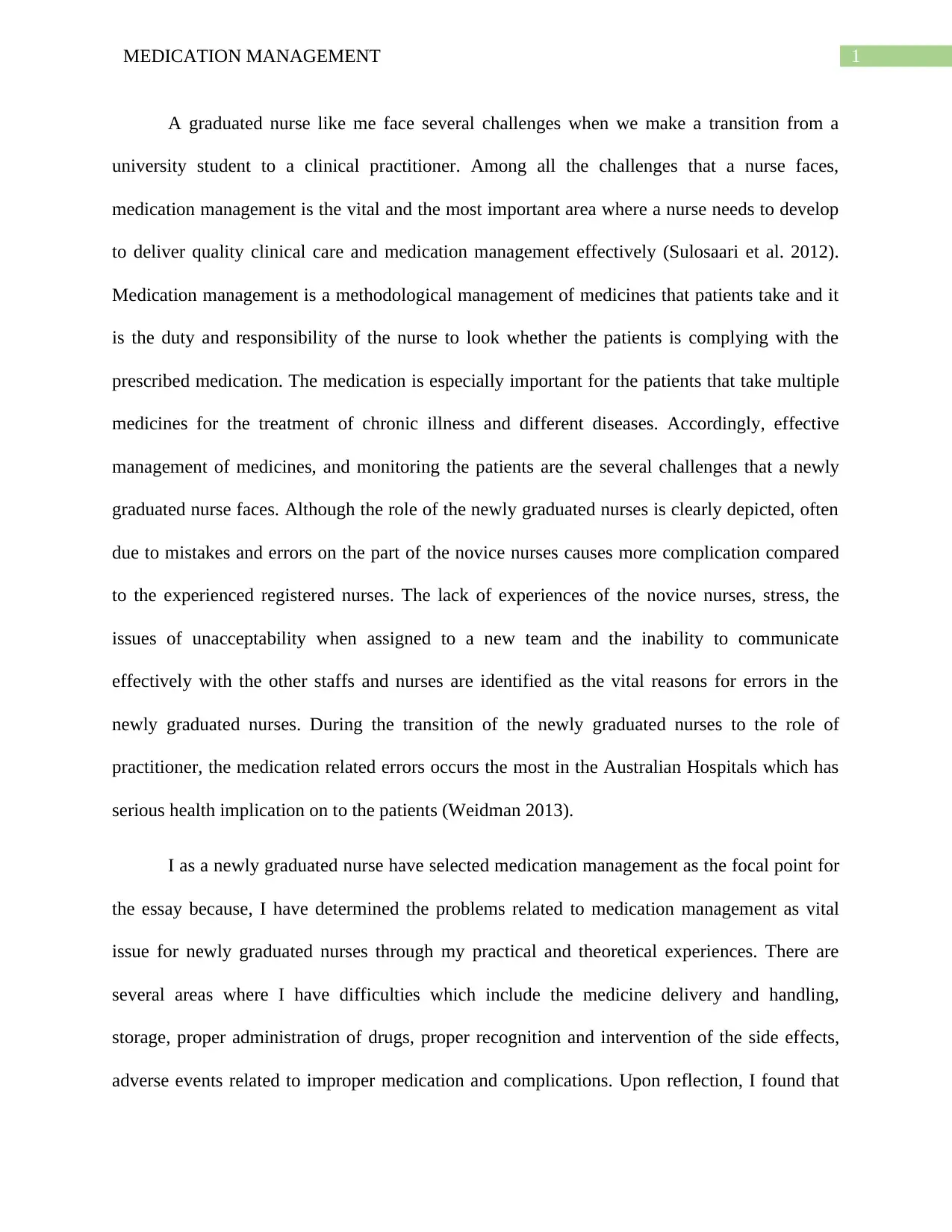
1MEDICATION MANAGEMENT
A graduated nurse like me face several challenges when we make a transition from a
university student to a clinical practitioner. Among all the challenges that a nurse faces,
medication management is the vital and the most important area where a nurse needs to develop
to deliver quality clinical care and medication management effectively (Sulosaari et al. 2012).
Medication management is a methodological management of medicines that patients take and it
is the duty and responsibility of the nurse to look whether the patients is complying with the
prescribed medication. The medication is especially important for the patients that take multiple
medicines for the treatment of chronic illness and different diseases. Accordingly, effective
management of medicines, and monitoring the patients are the several challenges that a newly
graduated nurse faces. Although the role of the newly graduated nurses is clearly depicted, often
due to mistakes and errors on the part of the novice nurses causes more complication compared
to the experienced registered nurses. The lack of experiences of the novice nurses, stress, the
issues of unacceptability when assigned to a new team and the inability to communicate
effectively with the other staffs and nurses are identified as the vital reasons for errors in the
newly graduated nurses. During the transition of the newly graduated nurses to the role of
practitioner, the medication related errors occurs the most in the Australian Hospitals which has
serious health implication on to the patients (Weidman 2013).
I as a newly graduated nurse have selected medication management as the focal point for
the essay because, I have determined the problems related to medication management as vital
issue for newly graduated nurses through my practical and theoretical experiences. There are
several areas where I have difficulties which include the medicine delivery and handling,
storage, proper administration of drugs, proper recognition and intervention of the side effects,
adverse events related to improper medication and complications. Upon reflection, I found that
A graduated nurse like me face several challenges when we make a transition from a
university student to a clinical practitioner. Among all the challenges that a nurse faces,
medication management is the vital and the most important area where a nurse needs to develop
to deliver quality clinical care and medication management effectively (Sulosaari et al. 2012).
Medication management is a methodological management of medicines that patients take and it
is the duty and responsibility of the nurse to look whether the patients is complying with the
prescribed medication. The medication is especially important for the patients that take multiple
medicines for the treatment of chronic illness and different diseases. Accordingly, effective
management of medicines, and monitoring the patients are the several challenges that a newly
graduated nurse faces. Although the role of the newly graduated nurses is clearly depicted, often
due to mistakes and errors on the part of the novice nurses causes more complication compared
to the experienced registered nurses. The lack of experiences of the novice nurses, stress, the
issues of unacceptability when assigned to a new team and the inability to communicate
effectively with the other staffs and nurses are identified as the vital reasons for errors in the
newly graduated nurses. During the transition of the newly graduated nurses to the role of
practitioner, the medication related errors occurs the most in the Australian Hospitals which has
serious health implication on to the patients (Weidman 2013).
I as a newly graduated nurse have selected medication management as the focal point for
the essay because, I have determined the problems related to medication management as vital
issue for newly graduated nurses through my practical and theoretical experiences. There are
several areas where I have difficulties which include the medicine delivery and handling,
storage, proper administration of drugs, proper recognition and intervention of the side effects,
adverse events related to improper medication and complications. Upon reflection, I found that
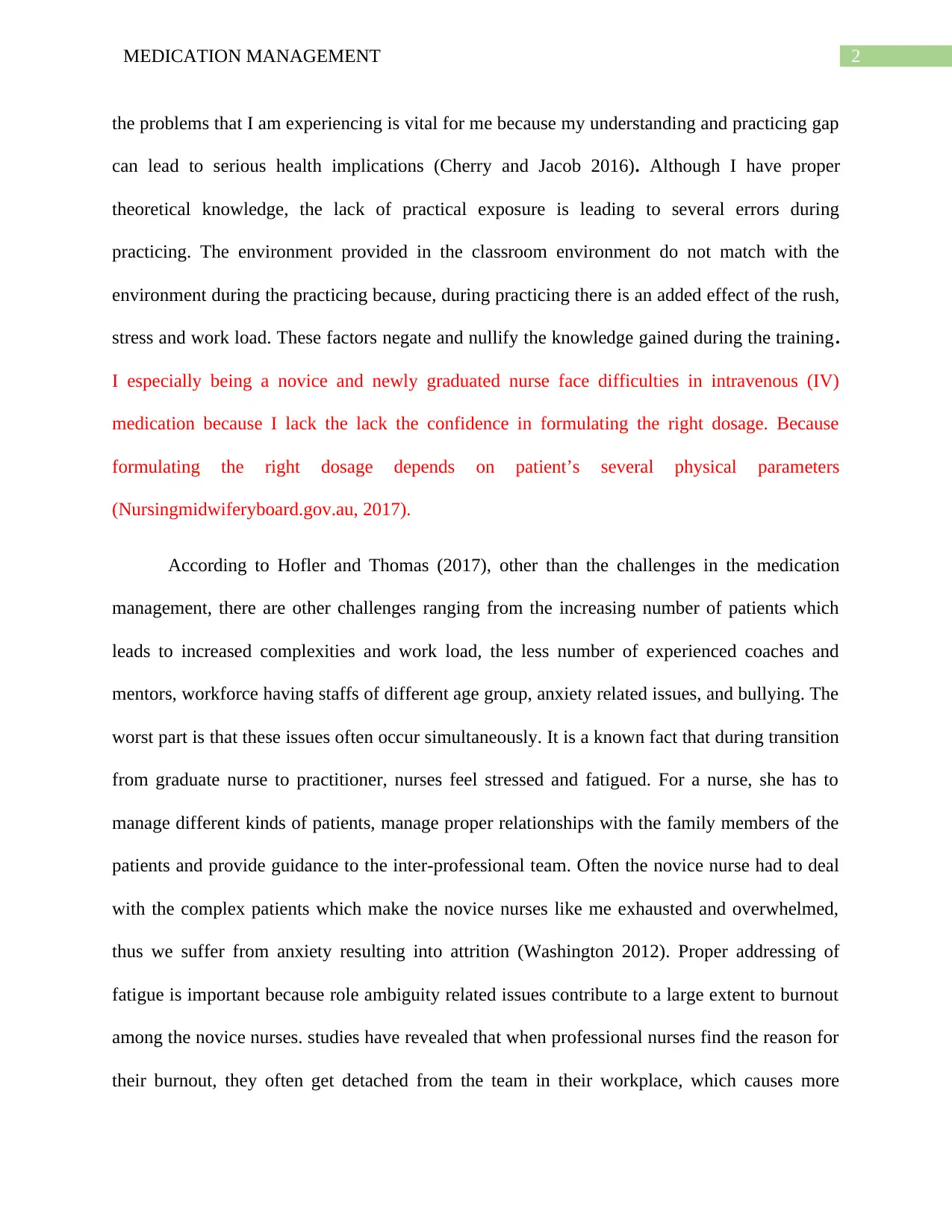
2MEDICATION MANAGEMENT
the problems that I am experiencing is vital for me because my understanding and practicing gap
can lead to serious health implications (Cherry and Jacob 2016). Although I have proper
theoretical knowledge, the lack of practical exposure is leading to several errors during
practicing. The environment provided in the classroom environment do not match with the
environment during the practicing because, during practicing there is an added effect of the rush,
stress and work load. These factors negate and nullify the knowledge gained during the training.
I especially being a novice and newly graduated nurse face difficulties in intravenous (IV)
medication because I lack the lack the confidence in formulating the right dosage. Because
formulating the right dosage depends on patient’s several physical parameters
(Nursingmidwiferyboard.gov.au, 2017).
According to Hofler and Thomas (2017), other than the challenges in the medication
management, there are other challenges ranging from the increasing number of patients which
leads to increased complexities and work load, the less number of experienced coaches and
mentors, workforce having staffs of different age group, anxiety related issues, and bullying. The
worst part is that these issues often occur simultaneously. It is a known fact that during transition
from graduate nurse to practitioner, nurses feel stressed and fatigued. For a nurse, she has to
manage different kinds of patients, manage proper relationships with the family members of the
patients and provide guidance to the inter-professional team. Often the novice nurse had to deal
with the complex patients which make the novice nurses like me exhausted and overwhelmed,
thus we suffer from anxiety resulting into attrition (Washington 2012). Proper addressing of
fatigue is important because role ambiguity related issues contribute to a large extent to burnout
among the novice nurses. studies have revealed that when professional nurses find the reason for
their burnout, they often get detached from the team in their workplace, which causes more
the problems that I am experiencing is vital for me because my understanding and practicing gap
can lead to serious health implications (Cherry and Jacob 2016). Although I have proper
theoretical knowledge, the lack of practical exposure is leading to several errors during
practicing. The environment provided in the classroom environment do not match with the
environment during the practicing because, during practicing there is an added effect of the rush,
stress and work load. These factors negate and nullify the knowledge gained during the training.
I especially being a novice and newly graduated nurse face difficulties in intravenous (IV)
medication because I lack the lack the confidence in formulating the right dosage. Because
formulating the right dosage depends on patient’s several physical parameters
(Nursingmidwiferyboard.gov.au, 2017).
According to Hofler and Thomas (2017), other than the challenges in the medication
management, there are other challenges ranging from the increasing number of patients which
leads to increased complexities and work load, the less number of experienced coaches and
mentors, workforce having staffs of different age group, anxiety related issues, and bullying. The
worst part is that these issues often occur simultaneously. It is a known fact that during transition
from graduate nurse to practitioner, nurses feel stressed and fatigued. For a nurse, she has to
manage different kinds of patients, manage proper relationships with the family members of the
patients and provide guidance to the inter-professional team. Often the novice nurse had to deal
with the complex patients which make the novice nurses like me exhausted and overwhelmed,
thus we suffer from anxiety resulting into attrition (Washington 2012). Proper addressing of
fatigue is important because role ambiguity related issues contribute to a large extent to burnout
among the novice nurses. studies have revealed that when professional nurses find the reason for
their burnout, they often get detached from the team in their workplace, which causes more
⊘ This is a preview!⊘
Do you want full access?
Subscribe today to unlock all pages.

Trusted by 1+ million students worldwide
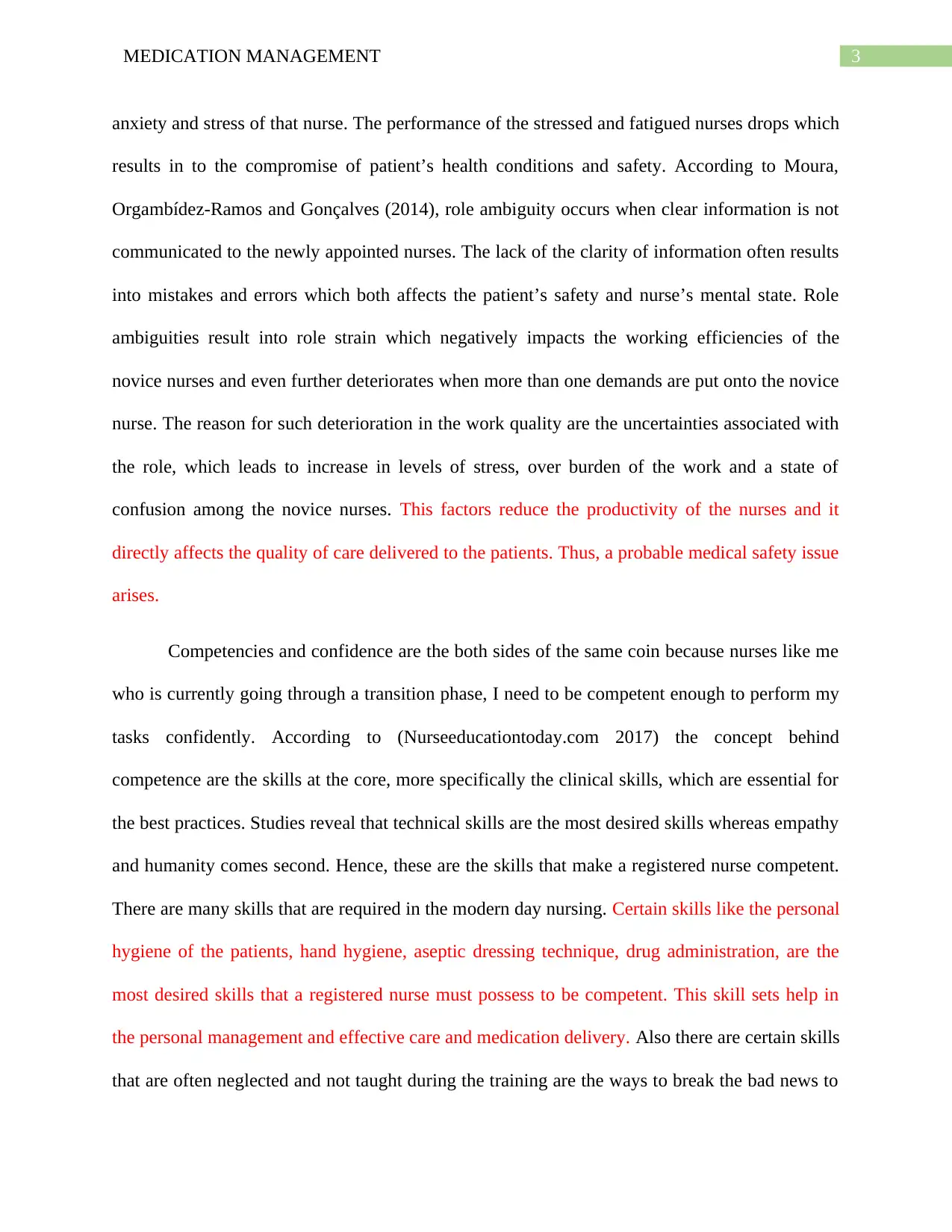
3MEDICATION MANAGEMENT
anxiety and stress of that nurse. The performance of the stressed and fatigued nurses drops which
results in to the compromise of patient’s health conditions and safety. According to Moura,
Orgambídez-Ramos and Gonçalves (2014), role ambiguity occurs when clear information is not
communicated to the newly appointed nurses. The lack of the clarity of information often results
into mistakes and errors which both affects the patient’s safety and nurse’s mental state. Role
ambiguities result into role strain which negatively impacts the working efficiencies of the
novice nurses and even further deteriorates when more than one demands are put onto the novice
nurse. The reason for such deterioration in the work quality are the uncertainties associated with
the role, which leads to increase in levels of stress, over burden of the work and a state of
confusion among the novice nurses. This factors reduce the productivity of the nurses and it
directly affects the quality of care delivered to the patients. Thus, a probable medical safety issue
arises.
Competencies and confidence are the both sides of the same coin because nurses like me
who is currently going through a transition phase, I need to be competent enough to perform my
tasks confidently. According to (Nurseeducationtoday.com 2017) the concept behind
competence are the skills at the core, more specifically the clinical skills, which are essential for
the best practices. Studies reveal that technical skills are the most desired skills whereas empathy
and humanity comes second. Hence, these are the skills that make a registered nurse competent.
There are many skills that are required in the modern day nursing. Certain skills like the personal
hygiene of the patients, hand hygiene, aseptic dressing technique, drug administration, are the
most desired skills that a registered nurse must possess to be competent. This skill sets help in
the personal management and effective care and medication delivery. Also there are certain skills
that are often neglected and not taught during the training are the ways to break the bad news to
anxiety and stress of that nurse. The performance of the stressed and fatigued nurses drops which
results in to the compromise of patient’s health conditions and safety. According to Moura,
Orgambídez-Ramos and Gonçalves (2014), role ambiguity occurs when clear information is not
communicated to the newly appointed nurses. The lack of the clarity of information often results
into mistakes and errors which both affects the patient’s safety and nurse’s mental state. Role
ambiguities result into role strain which negatively impacts the working efficiencies of the
novice nurses and even further deteriorates when more than one demands are put onto the novice
nurse. The reason for such deterioration in the work quality are the uncertainties associated with
the role, which leads to increase in levels of stress, over burden of the work and a state of
confusion among the novice nurses. This factors reduce the productivity of the nurses and it
directly affects the quality of care delivered to the patients. Thus, a probable medical safety issue
arises.
Competencies and confidence are the both sides of the same coin because nurses like me
who is currently going through a transition phase, I need to be competent enough to perform my
tasks confidently. According to (Nurseeducationtoday.com 2017) the concept behind
competence are the skills at the core, more specifically the clinical skills, which are essential for
the best practices. Studies reveal that technical skills are the most desired skills whereas empathy
and humanity comes second. Hence, these are the skills that make a registered nurse competent.
There are many skills that are required in the modern day nursing. Certain skills like the personal
hygiene of the patients, hand hygiene, aseptic dressing technique, drug administration, are the
most desired skills that a registered nurse must possess to be competent. This skill sets help in
the personal management and effective care and medication delivery. Also there are certain skills
that are often neglected and not taught during the training are the ways to break the bad news to
Paraphrase This Document
Need a fresh take? Get an instant paraphrase of this document with our AI Paraphraser
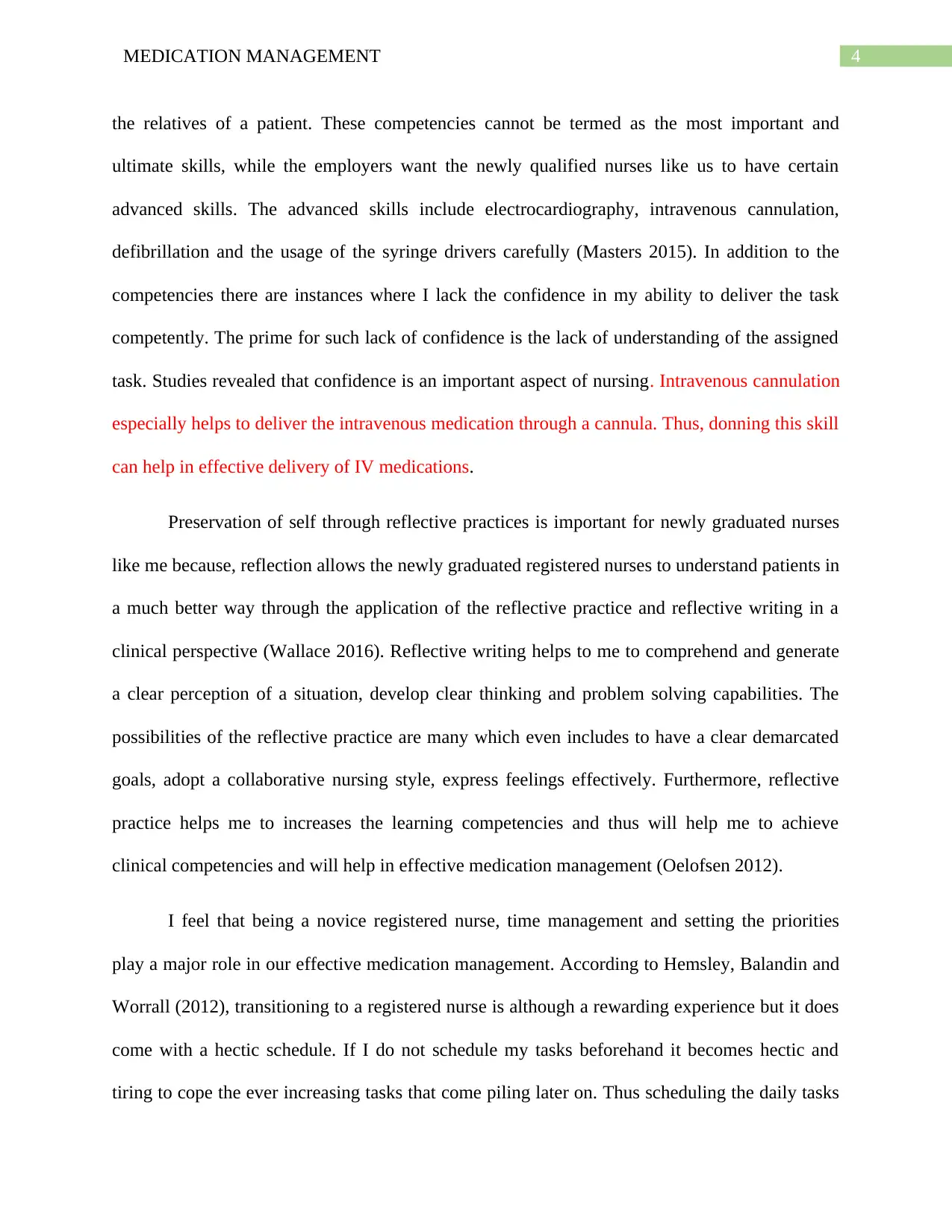
4MEDICATION MANAGEMENT
the relatives of a patient. These competencies cannot be termed as the most important and
ultimate skills, while the employers want the newly qualified nurses like us to have certain
advanced skills. The advanced skills include electrocardiography, intravenous cannulation,
defibrillation and the usage of the syringe drivers carefully (Masters 2015). In addition to the
competencies there are instances where I lack the confidence in my ability to deliver the task
competently. The prime for such lack of confidence is the lack of understanding of the assigned
task. Studies revealed that confidence is an important aspect of nursing. Intravenous cannulation
especially helps to deliver the intravenous medication through a cannula. Thus, donning this skill
can help in effective delivery of IV medications.
Preservation of self through reflective practices is important for newly graduated nurses
like me because, reflection allows the newly graduated registered nurses to understand patients in
a much better way through the application of the reflective practice and reflective writing in a
clinical perspective (Wallace 2016). Reflective writing helps to me to comprehend and generate
a clear perception of a situation, develop clear thinking and problem solving capabilities. The
possibilities of the reflective practice are many which even includes to have a clear demarcated
goals, adopt a collaborative nursing style, express feelings effectively. Furthermore, reflective
practice helps me to increases the learning competencies and thus will help me to achieve
clinical competencies and will help in effective medication management (Oelofsen 2012).
I feel that being a novice registered nurse, time management and setting the priorities
play a major role in our effective medication management. According to Hemsley, Balandin and
Worrall (2012), transitioning to a registered nurse is although a rewarding experience but it does
come with a hectic schedule. If I do not schedule my tasks beforehand it becomes hectic and
tiring to cope the ever increasing tasks that come piling later on. Thus scheduling the daily tasks
the relatives of a patient. These competencies cannot be termed as the most important and
ultimate skills, while the employers want the newly qualified nurses like us to have certain
advanced skills. The advanced skills include electrocardiography, intravenous cannulation,
defibrillation and the usage of the syringe drivers carefully (Masters 2015). In addition to the
competencies there are instances where I lack the confidence in my ability to deliver the task
competently. The prime for such lack of confidence is the lack of understanding of the assigned
task. Studies revealed that confidence is an important aspect of nursing. Intravenous cannulation
especially helps to deliver the intravenous medication through a cannula. Thus, donning this skill
can help in effective delivery of IV medications.
Preservation of self through reflective practices is important for newly graduated nurses
like me because, reflection allows the newly graduated registered nurses to understand patients in
a much better way through the application of the reflective practice and reflective writing in a
clinical perspective (Wallace 2016). Reflective writing helps to me to comprehend and generate
a clear perception of a situation, develop clear thinking and problem solving capabilities. The
possibilities of the reflective practice are many which even includes to have a clear demarcated
goals, adopt a collaborative nursing style, express feelings effectively. Furthermore, reflective
practice helps me to increases the learning competencies and thus will help me to achieve
clinical competencies and will help in effective medication management (Oelofsen 2012).
I feel that being a novice registered nurse, time management and setting the priorities
play a major role in our effective medication management. According to Hemsley, Balandin and
Worrall (2012), transitioning to a registered nurse is although a rewarding experience but it does
come with a hectic schedule. If I do not schedule my tasks beforehand it becomes hectic and
tiring to cope the ever increasing tasks that come piling later on. Thus scheduling the daily tasks
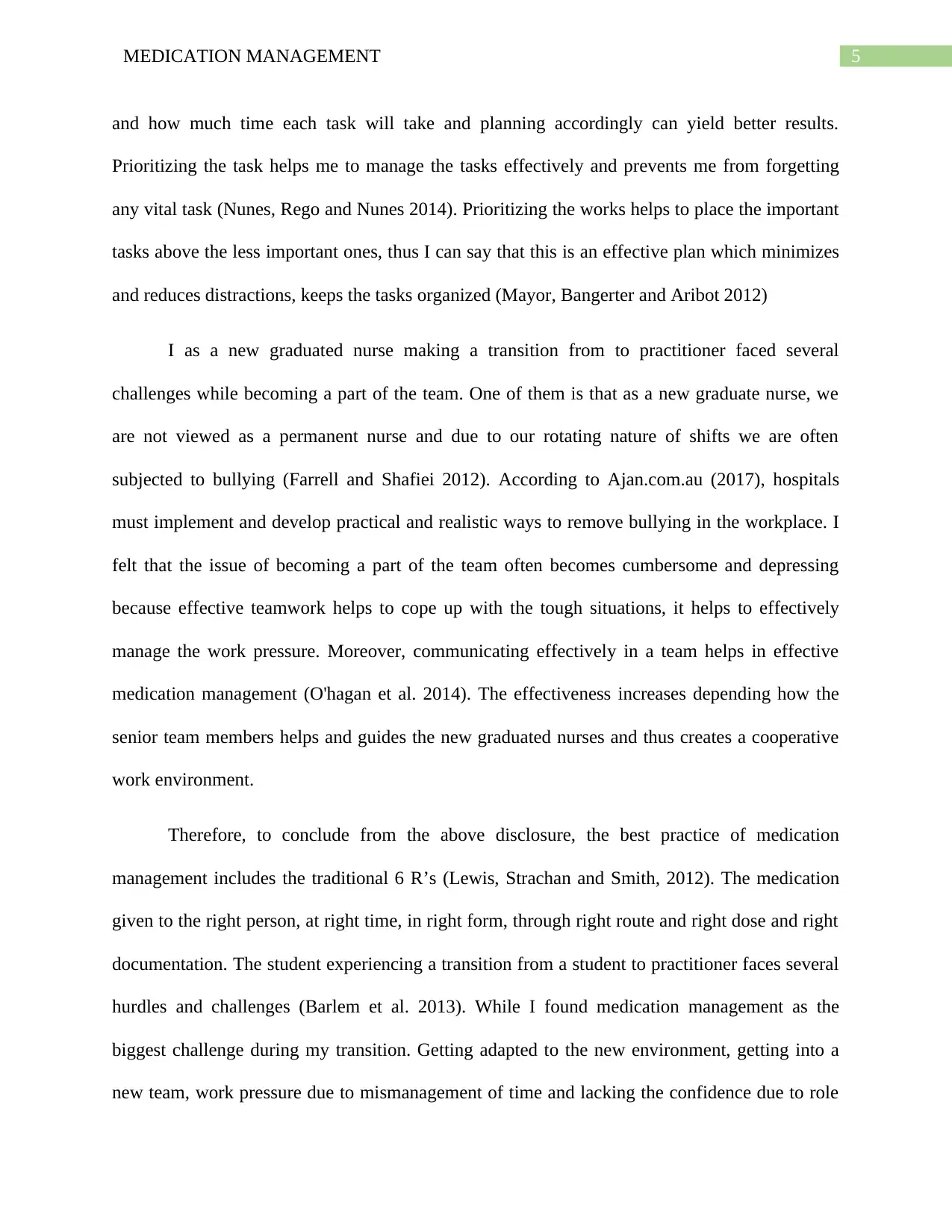
5MEDICATION MANAGEMENT
and how much time each task will take and planning accordingly can yield better results.
Prioritizing the task helps me to manage the tasks effectively and prevents me from forgetting
any vital task (Nunes, Rego and Nunes 2014). Prioritizing the works helps to place the important
tasks above the less important ones, thus I can say that this is an effective plan which minimizes
and reduces distractions, keeps the tasks organized (Mayor, Bangerter and Aribot 2012)
I as a new graduated nurse making a transition from to practitioner faced several
challenges while becoming a part of the team. One of them is that as a new graduate nurse, we
are not viewed as a permanent nurse and due to our rotating nature of shifts we are often
subjected to bullying (Farrell and Shafiei 2012). According to Ajan.com.au (2017), hospitals
must implement and develop practical and realistic ways to remove bullying in the workplace. I
felt that the issue of becoming a part of the team often becomes cumbersome and depressing
because effective teamwork helps to cope up with the tough situations, it helps to effectively
manage the work pressure. Moreover, communicating effectively in a team helps in effective
medication management (O'hagan et al. 2014). The effectiveness increases depending how the
senior team members helps and guides the new graduated nurses and thus creates a cooperative
work environment.
Therefore, to conclude from the above disclosure, the best practice of medication
management includes the traditional 6 R’s (Lewis, Strachan and Smith, 2012). The medication
given to the right person, at right time, in right form, through right route and right dose and right
documentation. The student experiencing a transition from a student to practitioner faces several
hurdles and challenges (Barlem et al. 2013). While I found medication management as the
biggest challenge during my transition. Getting adapted to the new environment, getting into a
new team, work pressure due to mismanagement of time and lacking the confidence due to role
and how much time each task will take and planning accordingly can yield better results.
Prioritizing the task helps me to manage the tasks effectively and prevents me from forgetting
any vital task (Nunes, Rego and Nunes 2014). Prioritizing the works helps to place the important
tasks above the less important ones, thus I can say that this is an effective plan which minimizes
and reduces distractions, keeps the tasks organized (Mayor, Bangerter and Aribot 2012)
I as a new graduated nurse making a transition from to practitioner faced several
challenges while becoming a part of the team. One of them is that as a new graduate nurse, we
are not viewed as a permanent nurse and due to our rotating nature of shifts we are often
subjected to bullying (Farrell and Shafiei 2012). According to Ajan.com.au (2017), hospitals
must implement and develop practical and realistic ways to remove bullying in the workplace. I
felt that the issue of becoming a part of the team often becomes cumbersome and depressing
because effective teamwork helps to cope up with the tough situations, it helps to effectively
manage the work pressure. Moreover, communicating effectively in a team helps in effective
medication management (O'hagan et al. 2014). The effectiveness increases depending how the
senior team members helps and guides the new graduated nurses and thus creates a cooperative
work environment.
Therefore, to conclude from the above disclosure, the best practice of medication
management includes the traditional 6 R’s (Lewis, Strachan and Smith, 2012). The medication
given to the right person, at right time, in right form, through right route and right dose and right
documentation. The student experiencing a transition from a student to practitioner faces several
hurdles and challenges (Barlem et al. 2013). While I found medication management as the
biggest challenge during my transition. Getting adapted to the new environment, getting into a
new team, work pressure due to mismanagement of time and lacking the confidence due to role
⊘ This is a preview!⊘
Do you want full access?
Subscribe today to unlock all pages.

Trusted by 1+ million students worldwide
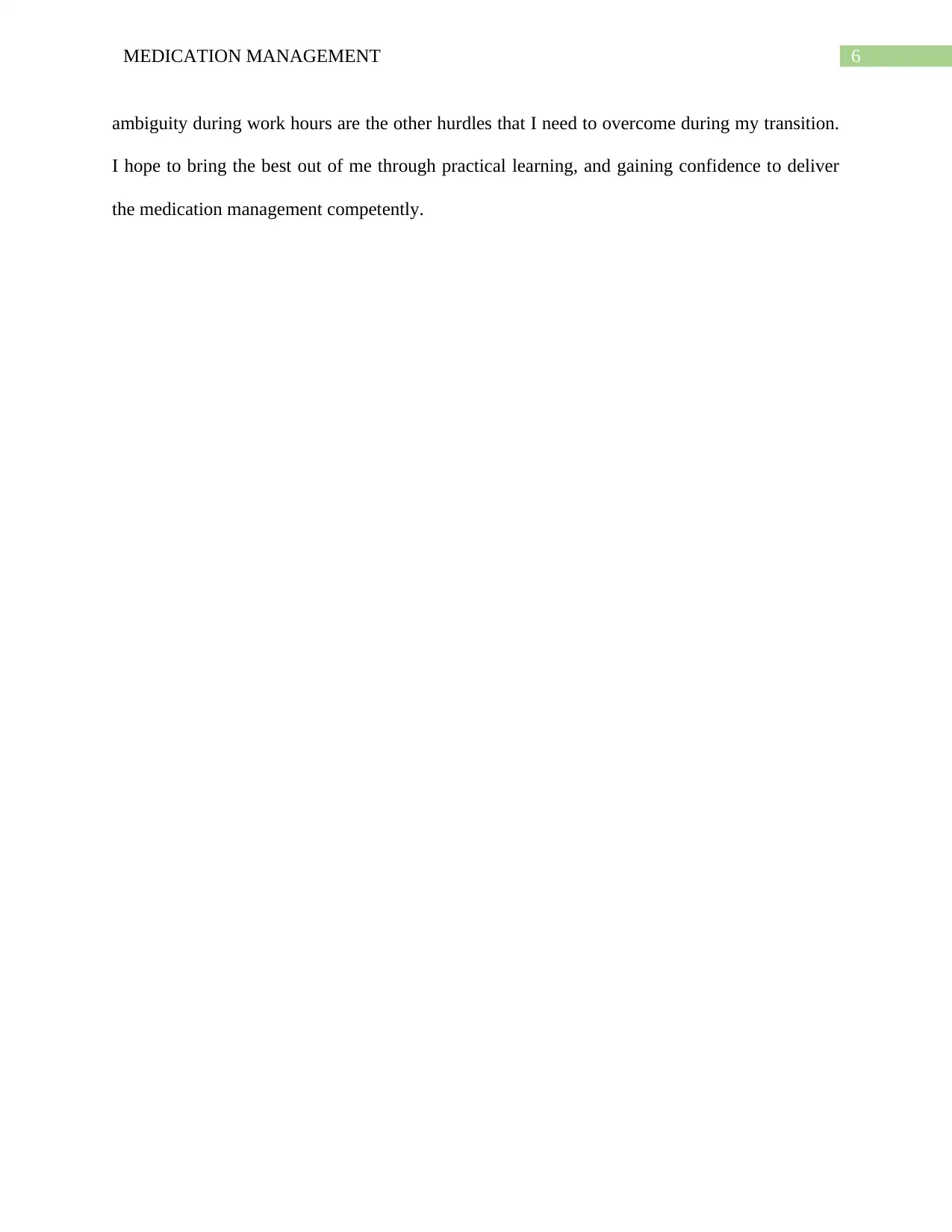
6MEDICATION MANAGEMENT
ambiguity during work hours are the other hurdles that I need to overcome during my transition.
I hope to bring the best out of me through practical learning, and gaining confidence to deliver
the medication management competently.
ambiguity during work hours are the other hurdles that I need to overcome during my transition.
I hope to bring the best out of me through practical learning, and gaining confidence to deliver
the medication management competently.
Paraphrase This Document
Need a fresh take? Get an instant paraphrase of this document with our AI Paraphraser
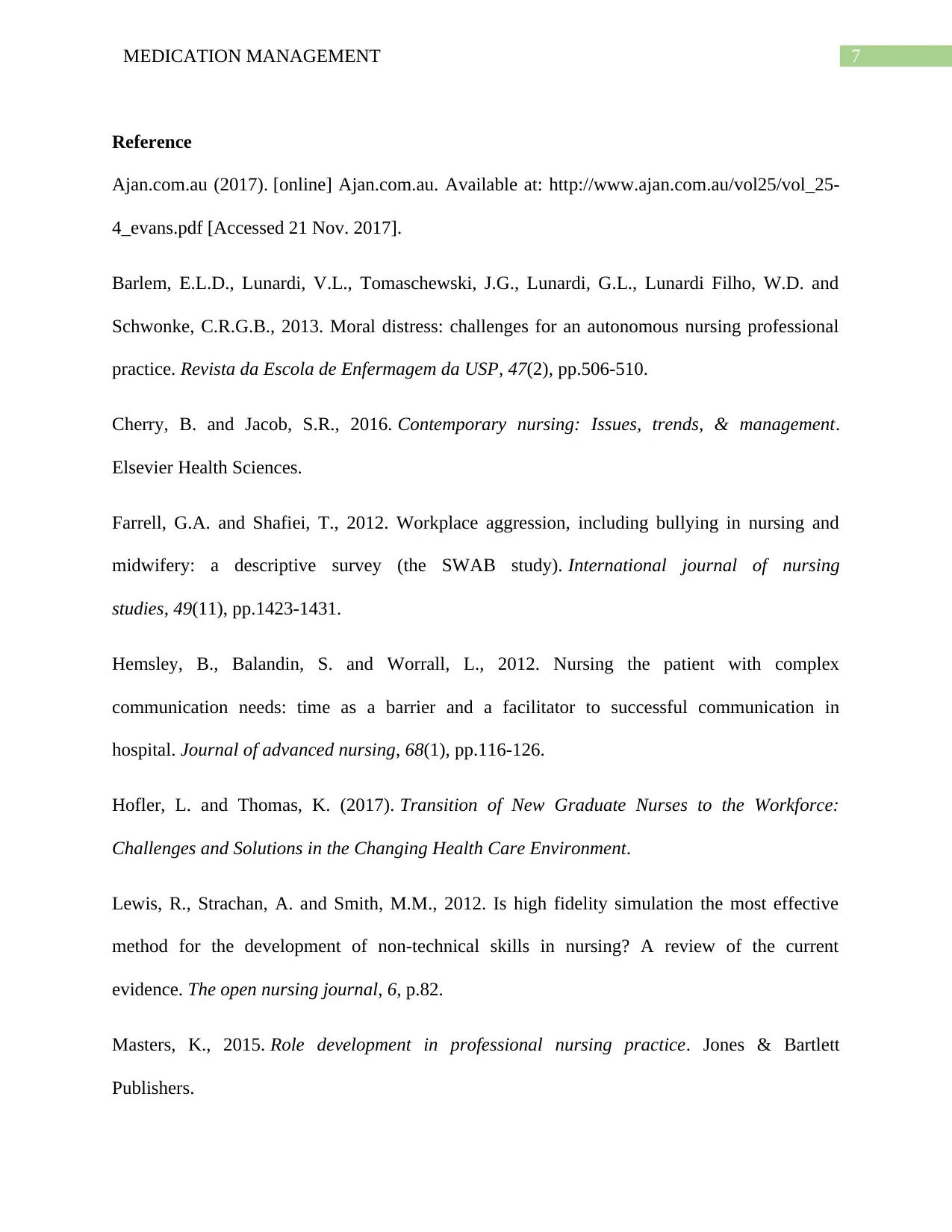
7MEDICATION MANAGEMENT
Reference
Ajan.com.au (2017). [online] Ajan.com.au. Available at: http://www.ajan.com.au/vol25/vol_25-
4_evans.pdf [Accessed 21 Nov. 2017].
Barlem, E.L.D., Lunardi, V.L., Tomaschewski, J.G., Lunardi, G.L., Lunardi Filho, W.D. and
Schwonke, C.R.G.B., 2013. Moral distress: challenges for an autonomous nursing professional
practice. Revista da Escola de Enfermagem da USP, 47(2), pp.506-510.
Cherry, B. and Jacob, S.R., 2016. Contemporary nursing: Issues, trends, & management.
Elsevier Health Sciences.
Farrell, G.A. and Shafiei, T., 2012. Workplace aggression, including bullying in nursing and
midwifery: a descriptive survey (the SWAB study). International journal of nursing
studies, 49(11), pp.1423-1431.
Hemsley, B., Balandin, S. and Worrall, L., 2012. Nursing the patient with complex
communication needs: time as a barrier and a facilitator to successful communication in
hospital. Journal of advanced nursing, 68(1), pp.116-126.
Hofler, L. and Thomas, K. (2017). Transition of New Graduate Nurses to the Workforce:
Challenges and Solutions in the Changing Health Care Environment.
Lewis, R., Strachan, A. and Smith, M.M., 2012. Is high fidelity simulation the most effective
method for the development of non-technical skills in nursing? A review of the current
evidence. The open nursing journal, 6, p.82.
Masters, K., 2015. Role development in professional nursing practice. Jones & Bartlett
Publishers.
Reference
Ajan.com.au (2017). [online] Ajan.com.au. Available at: http://www.ajan.com.au/vol25/vol_25-
4_evans.pdf [Accessed 21 Nov. 2017].
Barlem, E.L.D., Lunardi, V.L., Tomaschewski, J.G., Lunardi, G.L., Lunardi Filho, W.D. and
Schwonke, C.R.G.B., 2013. Moral distress: challenges for an autonomous nursing professional
practice. Revista da Escola de Enfermagem da USP, 47(2), pp.506-510.
Cherry, B. and Jacob, S.R., 2016. Contemporary nursing: Issues, trends, & management.
Elsevier Health Sciences.
Farrell, G.A. and Shafiei, T., 2012. Workplace aggression, including bullying in nursing and
midwifery: a descriptive survey (the SWAB study). International journal of nursing
studies, 49(11), pp.1423-1431.
Hemsley, B., Balandin, S. and Worrall, L., 2012. Nursing the patient with complex
communication needs: time as a barrier and a facilitator to successful communication in
hospital. Journal of advanced nursing, 68(1), pp.116-126.
Hofler, L. and Thomas, K. (2017). Transition of New Graduate Nurses to the Workforce:
Challenges and Solutions in the Changing Health Care Environment.
Lewis, R., Strachan, A. and Smith, M.M., 2012. Is high fidelity simulation the most effective
method for the development of non-technical skills in nursing? A review of the current
evidence. The open nursing journal, 6, p.82.
Masters, K., 2015. Role development in professional nursing practice. Jones & Bartlett
Publishers.
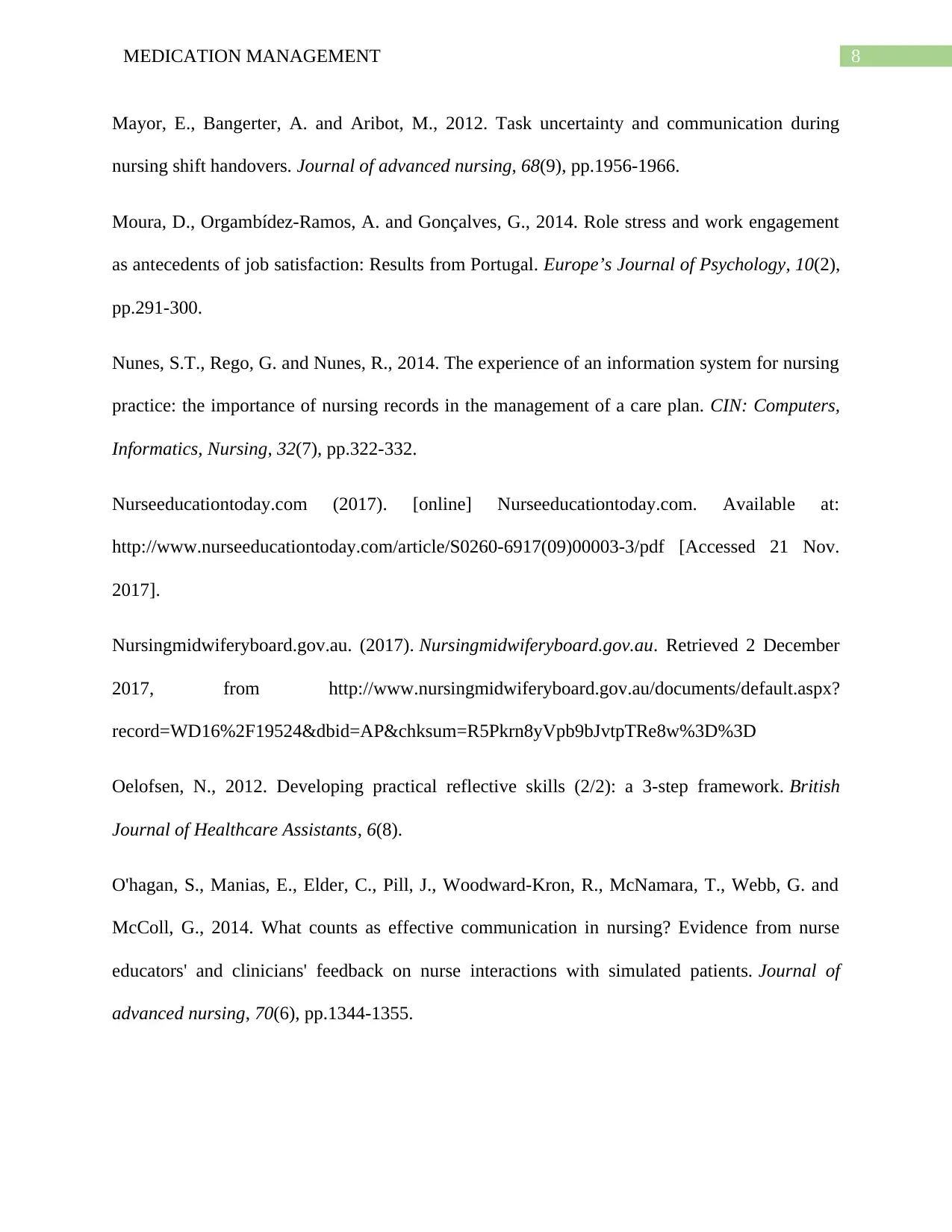
8MEDICATION MANAGEMENT
Mayor, E., Bangerter, A. and Aribot, M., 2012. Task uncertainty and communication during
nursing shift handovers. Journal of advanced nursing, 68(9), pp.1956-1966.
Moura, D., Orgambídez-Ramos, A. and Gonçalves, G., 2014. Role stress and work engagement
as antecedents of job satisfaction: Results from Portugal. Europe’s Journal of Psychology, 10(2),
pp.291-300.
Nunes, S.T., Rego, G. and Nunes, R., 2014. The experience of an information system for nursing
practice: the importance of nursing records in the management of a care plan. CIN: Computers,
Informatics, Nursing, 32(7), pp.322-332.
Nurseeducationtoday.com (2017). [online] Nurseeducationtoday.com. Available at:
http://www.nurseeducationtoday.com/article/S0260-6917(09)00003-3/pdf [Accessed 21 Nov.
2017].
Nursingmidwiferyboard.gov.au. (2017). Nursingmidwiferyboard.gov.au. Retrieved 2 December
2017, from http://www.nursingmidwiferyboard.gov.au/documents/default.aspx?
record=WD16%2F19524&dbid=AP&chksum=R5Pkrn8yVpb9bJvtpTRe8w%3D%3D
Oelofsen, N., 2012. Developing practical reflective skills (2/2): a 3-step framework. British
Journal of Healthcare Assistants, 6(8).
O'hagan, S., Manias, E., Elder, C., Pill, J., Woodward‐Kron, R., McNamara, T., Webb, G. and
McColl, G., 2014. What counts as effective communication in nursing? Evidence from nurse
educators' and clinicians' feedback on nurse interactions with simulated patients. Journal of
advanced nursing, 70(6), pp.1344-1355.
Mayor, E., Bangerter, A. and Aribot, M., 2012. Task uncertainty and communication during
nursing shift handovers. Journal of advanced nursing, 68(9), pp.1956-1966.
Moura, D., Orgambídez-Ramos, A. and Gonçalves, G., 2014. Role stress and work engagement
as antecedents of job satisfaction: Results from Portugal. Europe’s Journal of Psychology, 10(2),
pp.291-300.
Nunes, S.T., Rego, G. and Nunes, R., 2014. The experience of an information system for nursing
practice: the importance of nursing records in the management of a care plan. CIN: Computers,
Informatics, Nursing, 32(7), pp.322-332.
Nurseeducationtoday.com (2017). [online] Nurseeducationtoday.com. Available at:
http://www.nurseeducationtoday.com/article/S0260-6917(09)00003-3/pdf [Accessed 21 Nov.
2017].
Nursingmidwiferyboard.gov.au. (2017). Nursingmidwiferyboard.gov.au. Retrieved 2 December
2017, from http://www.nursingmidwiferyboard.gov.au/documents/default.aspx?
record=WD16%2F19524&dbid=AP&chksum=R5Pkrn8yVpb9bJvtpTRe8w%3D%3D
Oelofsen, N., 2012. Developing practical reflective skills (2/2): a 3-step framework. British
Journal of Healthcare Assistants, 6(8).
O'hagan, S., Manias, E., Elder, C., Pill, J., Woodward‐Kron, R., McNamara, T., Webb, G. and
McColl, G., 2014. What counts as effective communication in nursing? Evidence from nurse
educators' and clinicians' feedback on nurse interactions with simulated patients. Journal of
advanced nursing, 70(6), pp.1344-1355.
⊘ This is a preview!⊘
Do you want full access?
Subscribe today to unlock all pages.

Trusted by 1+ million students worldwide
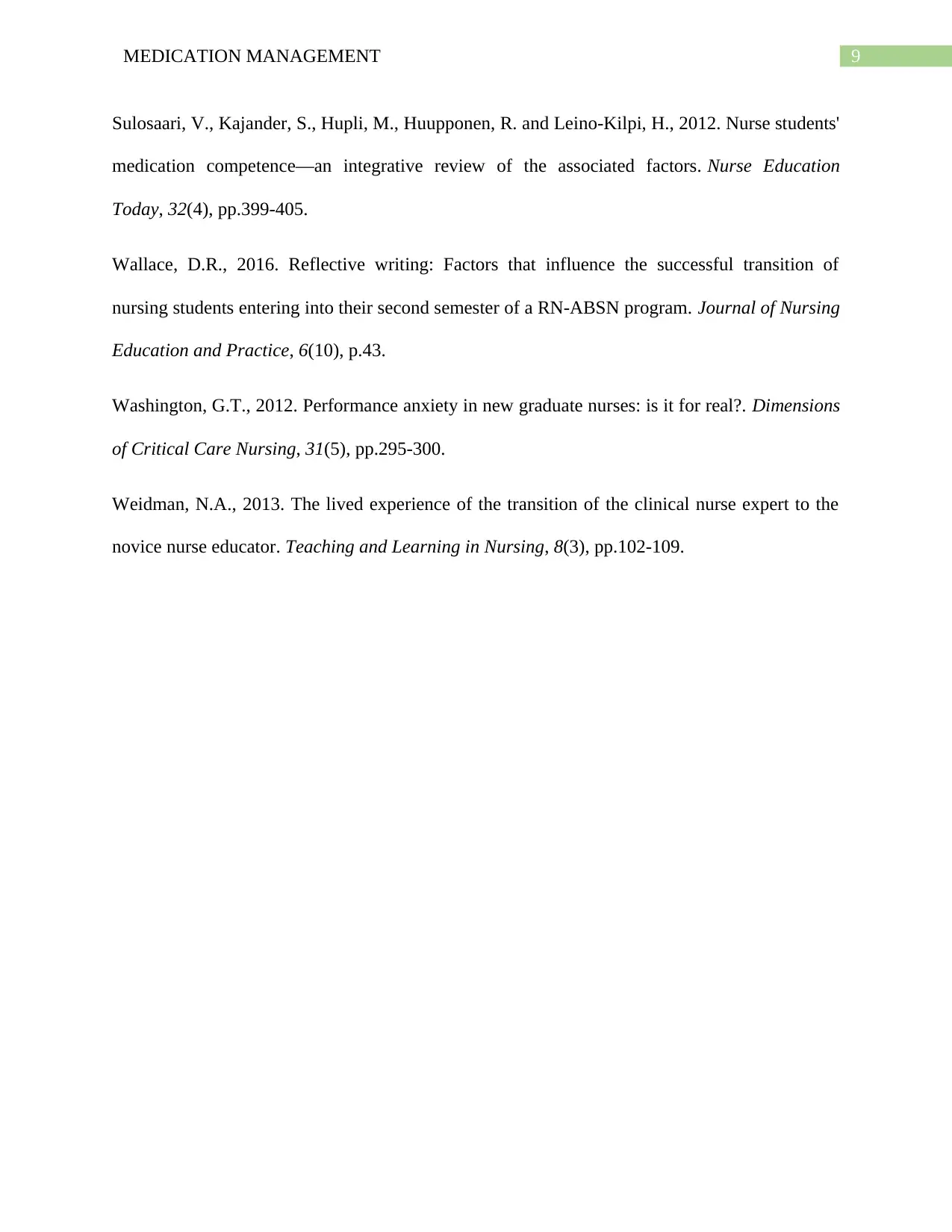
9MEDICATION MANAGEMENT
Sulosaari, V., Kajander, S., Hupli, M., Huupponen, R. and Leino-Kilpi, H., 2012. Nurse students'
medication competence—an integrative review of the associated factors. Nurse Education
Today, 32(4), pp.399-405.
Wallace, D.R., 2016. Reflective writing: Factors that influence the successful transition of
nursing students entering into their second semester of a RN-ABSN program. Journal of Nursing
Education and Practice, 6(10), p.43.
Washington, G.T., 2012. Performance anxiety in new graduate nurses: is it for real?. Dimensions
of Critical Care Nursing, 31(5), pp.295-300.
Weidman, N.A., 2013. The lived experience of the transition of the clinical nurse expert to the
novice nurse educator. Teaching and Learning in Nursing, 8(3), pp.102-109.
Sulosaari, V., Kajander, S., Hupli, M., Huupponen, R. and Leino-Kilpi, H., 2012. Nurse students'
medication competence—an integrative review of the associated factors. Nurse Education
Today, 32(4), pp.399-405.
Wallace, D.R., 2016. Reflective writing: Factors that influence the successful transition of
nursing students entering into their second semester of a RN-ABSN program. Journal of Nursing
Education and Practice, 6(10), p.43.
Washington, G.T., 2012. Performance anxiety in new graduate nurses: is it for real?. Dimensions
of Critical Care Nursing, 31(5), pp.295-300.
Weidman, N.A., 2013. The lived experience of the transition of the clinical nurse expert to the
novice nurse educator. Teaching and Learning in Nursing, 8(3), pp.102-109.
1 out of 10
Related Documents
Your All-in-One AI-Powered Toolkit for Academic Success.
+13062052269
info@desklib.com
Available 24*7 on WhatsApp / Email
![[object Object]](/_next/static/media/star-bottom.7253800d.svg)
Unlock your academic potential
Copyright © 2020–2026 A2Z Services. All Rights Reserved. Developed and managed by ZUCOL.





